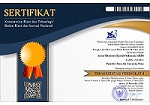- Focus and Scope
- Section Policies
- Peer Review Process
- Open Access Policy
- Archiving
- Author Fees
- Publication Ethics
- Article Retraction
- REPOSITORY POLICY
Focus and Scope
Focus and Scope
JESI : Jurnal Ekonomi Syariah Indonesia is a double-blind peer-reviewed journal published by Departement of Islamic Economics And Islamic Banking Universitas Alma Ata with The Indonesian Association of Islamic Economist.
Focus
JESI : Jurnal Ekonomi Syariah Indonesia emphasizes the study of Islamic Economics and Islamic Finance in general and specifically in Indonesia by emphasizing the theories of Islamic Economics and Islamic Finance and its practices in the Islamic worlds that developed in attendance through publications of articles and literature reviews.
Scope
This Journal specializes in studying the theories and practices of Islamic Economics and Islamic Finance in Islamic countries and is intended to express original researches and current issues. This journal welcomes the contributions of scholars from related fields warmly that consider the following general topics;
- Islamic Economics
- Islamic Financial Institutions
- Islamic Management
- Islamic Accounting
- Islamic Public Finance
- Halal Study
Section Policies
Articles
Peer Review Process
Every articles will be reviewed by the reviewer. The review process using a double Blind Review, meaning that the reviewer does not know the identity of the author, and the author did not know the identity of the reviewer.
In the process of review, the reviewer gave consideration related to the suitability of the title, abstract, introduction, research methods, results and discussion and conclusions. Addition reviewer also gave consideration associated with novelty, scientific impact, and references used.
Open Access Policy
This journal provides immediate open access to its content on the principle that making research freely available to the public supports a greater global exchange of knowledge.
Archiving
This journal utilizes the LOCKSS system to create a distributed archiving system among participating libraries and permits those libraries to create permanent archives of the journal for purposes of preservation and restoration. More...
Author Fees
This journal charges the following author fees.
Article Submission: 0.00 (IDR)
Authors are required to pay an Article Submission Fee as part of the submission process to contribute to review costs.
Article Publication: 1.000.000 (IDR)
If this article has been accepted for publication, you will be asked to pay the Article Publication Fee via a virtual account.
Official payments can only be made through a virtual account issued by the Treasurer or Finance Department of Universitas Alma Ata.
Publication Ethics
JESI : Jurnal Ekonomi Syariah Indonesia is a Journal of Islamic Economics and Finance published by Departement of Islamic Economics And Islamic Banking with The Indonesian Association of Islamic Economists. It is a peer-reviewed open-access journal in the fields of Islamic Economics and Finance. JESI commit to embrace the best research article in Islamic economics and finance fields from the whole world and publish it consistently. The goal of the journal is to cover topics that are paramount in modern Islamic economics and finance. Accordingly, papers that focus on emerging and interdisciplinary topics are encouraged. In addition, the goal of the journal is to provide research that is relevant and applicable to a diverse set of Islamic Economics and Finance researchers and professionals. The publication of this journal though tighly-peer reviewed process using Open Journal System (OJS). It is a direct reflection of the quality of the work of the authors and the institutions that support them. Peer-reviewed articles support and embody the scientific method. It is important to agree upon standards of expected ethical behavior for all parties involved in the act of publishing: the author, the journal editors, the peer reviewers, and the publisher. In general, the ethics of publication JESI: Journal of Islamic Economics refers to COPE.
AUTHORS
1. Reporting Standard
Authors must present the original manuscript, not published in any form, and do not submit the same article to other journals until the publisher gives an answer regarding the feasibility of the manuscript. The authors should provide accurate and accountable research data. Authors must cite the sources appropriately by considering the content of the manuscript either in the form of written publications and personal interviews.
2. Originality and PlagiarismThe authors should ensure that they have written entirely original works, and if the authors have used the work and/or words of others that this has been appropriately cited or quoted.
3. Multiple, Redundant, or Concurrent Publication
An author should not in general publish manuscripts describing essentially the same research in more than one journal or primary publication. Submitting the same manuscript to more than one journal concurrently constitutes unethical publishing behavior and is unacceptable.
4. Authorship of the Paper
Authorship should be limited to those who have made a significant contribution to the conception, design, execution, or interpretation of the reported research. All those who have made significant contributions should be listed as co-authors. Where there are others who have participated in certain substantive aspects of the research project, they should be acknowledged or listed as contributors. The corresponding author should ensure that all appropriate co-authors and no inappropriate co-authors are included on the paper, and that all co-authors have seen and approved the final version of the paper and have agreed to its submission for publication.
5. Data Access and Retention
Authors may be asked to provide the raw data in connection with a paper for editorial review, and should in any event be prepared to retain such data for a reasonable time after publication.
6. Disclosure and Conflicts of Interest
All authors should disclose in their manuscript any financial or other substantive conflict of interest that might be construed to influence the results or interpretation of their manuscript. All sources of financial support for the project should be disclosed.
7. Fundamental errors in published works
When an author discovers a significant error or inaccuracy in his/her own published work, it is the author's obligation to promptly notify the journal editor or publisher and cooperate with the editor to retract or correct the paper. If the editor or the publisher learns from a third party that a published work contains a significant error, it is the obligation of the author to promptly retract or correct the paper or provide evidence to the editor of the correctness of the original paper.
8. Use of AI in academic writing
- This policy applies solely to the writing process and not to the use of AI for data analysis or to deriving insights from data as part of research activities.
- AI is permitted only to improve the readability and language quality of the manuscript. Human oversight is mandatory, as AI can produce outputs that appear credible, but may be incorrect, incomplete, or biased. The authors bear full responsibility for the contents of their work.
- The authors disclose the use of AI in their manuscript. This disclosure will be included in the published work to promote transparency and trust among the authors, readers, reviewers, editors, and contributors.
- AI must not be listed as an author or co-author because authorship responsibilities can only be attributed to humans.
- The use of AI to create or modify images in submitted manuscripts is prohibited for purposes such as enhancement, obfuscation, or addition of elements. Minor adjustments such as brightness or contrast modifications are permitted as long as they do not alter the original information.
- Exceptions are allowed if AI usage is part of the research methodology, such as biomedical imaging. In such cases, the use must be thoroughly detailed in the Methods section, including the name, version, and manufacturer of the technology.
EDITORS
The editor of the JESI is responsible for deciding which of the articles should be published. The validation of the work in question and its importance to researchers and readers must always drive such decisions. The editors may be guided by the policies of the journal's editorial board and constrained by such legal requirements as shall then be in force regarding libel, copyright infringement and plagiarism. The editors may confer with other editors or reviewers in making this decision.
1. Fair Play
An editor at any time evaluates manuscripts for their intellectual content without regard to race, gender, sexual orientation, religious belief, ethnic origin, citizenship, or political philosophy of the authors.
2. Confidentiality
The editors and any editorial staff must not disclose any information about a submitted manuscript to anyone other than the corresponding author, reviewers, potential reviewers, other editorial advisers, and the publisher, as appropriate.
3. Disclosure and Conflicts of Interest
Unpublished materials disclosed in a submitted manuscript must not be used in editors' own research without the express written consent of the author.
4. Confidentiality of Manuscripts and Communications
- The manuscripts must be treated as confidential documents. Editors are prohibited from uploading manuscripts or related communication such as decision letters to AI tools
- Editorial letters or notifications must not be uploaded to AI for language enhancement.
- AI must not be used in the evaluation process or editorial decision-making, as these processes require a critical judgment that only humans can perform
- The editors bear full responsibility for the editorial process, final decisions, and communication with authors.
AAUPress supports the adoption of technologies that strengthen the integrity and efficiency of the editorial process while adhering to the principles of confidentiality and protecting the rights of all parties involved.
REVIEWERS
1. Contribution to Editorial Decisions
Peer review assists the editor in making editorial decisions and through the editorial communications with the author may also assist the author in improving the quality of a paper.
2. Promptness
Any selected referee who feels unqualified to review the research reported in a manuscript or knows that its prompt review will be impossible should notify the editors and excuse himself from the review process.
3. Confidentiality
Any manuscripts received for review must be treated as confidential documents. They must not be shown to, or discussed with others except as authorized by the editor.
4. Standards of Objectivity
Reviews should be conducted objectively. Personal criticism of the author is inappropriate. The reviewers should express their views clearly with supporting rationale arguments.
5. Acknowledgment of Sources
Reviewers should identify the source of references that has not been cited by the authors. Any statement that an observation, derivation, or argument had been previously reported should be accompanied by the relevant citation. A reviewer should also call to the editor's attention any substantial similarity or overlap between the manuscript under consideration and any other published paper of which they have personal knowledge.
6. Disclosure and Conflict of Interest
Privileged information or ideas obtained through peer review must be kept confidential and not used for personal advantage. Reviewers should not consider manuscripts in which they have conflicts of interest resulting from competitive, collaborative, or other relationships with any of the authors or institutions connected to the papers.
7. PUBLISHER
It is committed to ensure that commercial interest has no impact or influence on editorial decisions. JESI: Jurnal Ekonomi Syariah Indonesia will assist in communications with other journals where this is useful to the authors. JESI is working closely with all related divisions to set standards for best practices on ethical matters, errors and retractions--and are prepared to provide specialized legal review and counsel if necessary
8. Confidentiality of manuscripts
- The manuscripts received for review are confidential documents. Reviewers are prohibited from uploading manuscripts or parts thereof to AI tools as this may violate the confidentiality rights of the authors
- Review reports are confidential and must not be uploaded to AI tools, even for language or readability enhancement purposes.
9. Prohibition of AI Use in the Review Process
- AI must not be used to assist in the review process. Scientific evaluation requires critical thinking and original assessments that are beyond the capabilities of AI
- The reviewers bear full responsibility for the accuracy and integrity of their reports.
Article Retraction
The papers published in the JESI (Jurnal Ekonomi Syariah Indonesia) will be consider to retract in the publication if :
- They have clear evidence that the findings are unreliable, either as a result of misconduct (e.g. data fabrication) or honest error (e.g. miscalculation or experimental error)
- the findings have previously been published elsewhere without proper crossreferencing, permission or justification (i.e. cases of redundant publication)
- it constitutes plagiarism
- it reports unethical research
The mechanism of retraction follows the Retraction Guidelines of Committee on Publication Ethics (COPE) which can be accessed at https://publicationethics.org/files/retraction%20guidelines.pdf.
REPOSITORY POLICY
For a journal to qualify for the DOAJ Seal, Jurnal Ekonomi Syariah (Jesi) allow all versions to be deposited in an institutional or other repository of the author’s choice without embargo.












